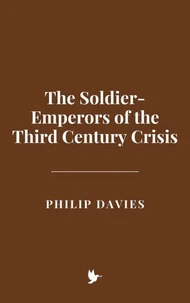In The Roman Senate: Power, Politics, and Social Influence, Philip Davies takes readers on a comprehensive journey through one of the most influential political institutions in history. From its origins as an advisory council to the kings of early Rome to its pivotal role in the Republic and its eventual decline under imperial rule, the Roman Senate shaped not only the governance of Rome but also the development of Western political thought.
This book delves deep into the Senate's complex evolution, examining its key role in shaping Roman law, military strategy, and public policy. It explores the intricate dynamics between senators and emperors, the growing influence of military commanders, and the fluctuating power of the Senate during times of political and social upheaval. Davies also investigates the Senate's changing relationship with Roman citizens, the plebeian class, and eventually the rise of Christianity, all of which contributed to the Senate's transformation over time.
Throughout, The Roman Senate provides readers with a rich analysis of the political maneuvering, social hierarchies, and legal innovations that made the Senate central to Roman political life for centuries. It also considers the legacy of the Senate's structure and principles, offering insight into how its ideas influenced the development of modern republican and parliamentary systems. From its peak during the Republic to its diminished status under the Empire, the Senate's story is one of power, adaptation, and survival.
This book is essential reading for anyone interested in the political history of Rome, the development of Western political institutions, or the intricate dynamics between power and governance.
In The Roman Senate: Power, Politics, and Social Influence, Philip Davies takes readers on a comprehensive journey through one of the most influential political institutions in history. From its origins as an advisory council to the kings of early Rome to its pivotal role in the Republic and its eventual decline under imperial rule, the Roman Senate shaped not only the governance of Rome but also the development of Western political thought.
This book delves deep into the Senate's complex evolution, examining its key role in shaping Roman law, military strategy, and public policy. It explores the intricate dynamics between senators and emperors, the growing influence of military commanders, and the fluctuating power of the Senate during times of political and social upheaval. Davies also investigates the Senate's changing relationship with Roman citizens, the plebeian class, and eventually the rise of Christianity, all of which contributed to the Senate's transformation over time.
Throughout, The Roman Senate provides readers with a rich analysis of the political maneuvering, social hierarchies, and legal innovations that made the Senate central to Roman political life for centuries. It also considers the legacy of the Senate's structure and principles, offering insight into how its ideas influenced the development of modern republican and parliamentary systems. From its peak during the Republic to its diminished status under the Empire, the Senate's story is one of power, adaptation, and survival.
This book is essential reading for anyone interested in the political history of Rome, the development of Western political institutions, or the intricate dynamics between power and governance.

 , qui est-ce ?
, qui est-ce ?